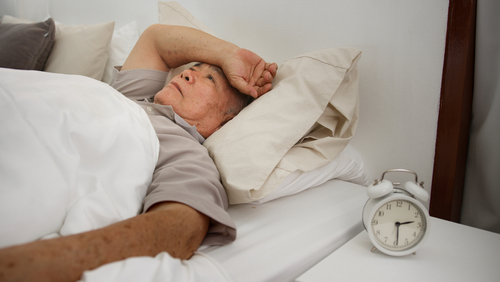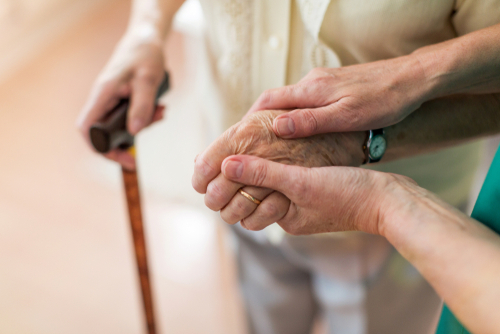
Ensuring Safety in Elderly Home Care
July 21, 2023
Signs That Your Aging Parent Needs Home Care Assistance
August 22, 2023Addressing Sleep Issues in Seniors

Addressing Sleep Issues in Seniors
Addressing Sleep Issues in Seniors – Sleep is vital to human health and well-being, becoming even more critical as we age.
Unfortunately, many seniors experience sleep-related problems that can significantly impact their quality of life.
This article will explore some common sleep issues seniors face and discuss strategies to address and improve their sleep patterns.
Table of Contents
Understanding Sleep Changes in Seniors
As individuals age, their sleep patterns tend to change due to various biological, psychological, and environmental factors. Some common sleep changes observed in seniors include:
Decreased Sleep Efficiency
Seniors often experience a decrease in sleep efficiency, which refers to the amount of time spent asleep compared to the total time spent in bed. This decline can lead to difficulties falling asleep and staying asleep throughout the night.
Changes in Sleep Architecture
With age, there are alterations in sleep architecture, meaning the distribution and proportions of different sleep stages. Seniors may experience a decrease in deep sleep (slow-wave sleep) and an increase in lighter sleep stages, resulting in less restorative sleep.
Common Sleep Issues in Seniors

Various sleep issues are prevalent among the senior population, and it’s essential to recognize and address them appropriately:
Insomnia
Insomnia is a common sleep disorder that affects seniors, characterized by difficulty falling asleep, staying asleep, or waking up too early and being unable to go back to sleep. Chronic insomnia can have adverse effects on overall health and well-being.
Sleep Apnea
Sleep apnea is another prevalent sleep disorder among seniors, particularly obstructive sleep apnea (OSA). This condition causes repetitive pauses in breathing during sleep, leading to disrupted sleep and potential health risks.
Restless Legs Syndrome (RLS)
Restless Legs Syndrome causes an irresistible urge to move the legs, usually accompanied by uncomfortable sensations. RLS can significantly disrupt sleep and lead to daytime fatigue and restlessness.
Circadian Rhythm Disruptions
Seniors may experience changes in their circadian rhythms, commonly referred to as the body’s internal clock. This can lead to irregular sleep-wake patterns, such as difficulty falling asleep at night and excessive daytime sleepiness.
Strategies to Improve Sleep in Seniors
Fortunately, several strategies can help seniors improve their sleep quality and manage sleep-related issues effectively:
Establish a Consistent Sleep Schedule
Encouraging seniors to sleep regularly can help regulate their internal clock. Going to bed and waking up at the same time every day, even on weekends, can promote better sleep quality.
Optimize Sleep Environment
Creating a comfortable sleep environment is crucial for seniors. Investing in a supportive mattress and pillows can also improve sleep quality.
Limit Daytime Napping
While short daytime naps can be refreshing, excessive napping can disrupt nighttime sleep. Encourage seniors to limit naps to 20-30 minutes and avoid napping too close to bedtime.
Encourage Regular Physical Activity
Regular exercise can contribute to better sleep in seniors. Engaging in moderate activities like walking, swimming, or yoga can help promote better sleep patterns.
Address Underlying Health Conditions
Seniors should seek medical attention for any underlying health conditions that may be affecting their sleep. Conditions like chronic pain, sleep apnea, or restless legs syndrome should be properly managed.
Limit Stimulants and Alcohol
Caffeine and alcohol can interfere with sleep patterns. It’s advisable for seniors to limit their consumption, especially in the hours leading up to bedtime.
Seek Professional Help
If sleep issues persist or worsen, it’s essential to consult a healthcare professional or a sleep specialist. They can assess the situation, identify any underlying problems, and recommend appropriate interventions.
The Role of Caregivers and Family

In addressing sleep issues in seniors, caregivers and family members play a crucial role. Providing support and understanding can make a significant difference in improving the sleep quality of seniors.
Encouraging Open Communication
Encouraging open communication with seniors about their sleep problems is essential. Listening to their concerns and experiences can help caregivers and family members better understand the challenges they face. By showing empathy and being proactive, caregivers can create a safe space for seniors to express their sleep-related worries and fears.
Assisting with Bedtime Preparations
Caregivers can assist seniors in establishing a consistent bedtime routine. Helping them with activities such as reading a book, enjoying a warm beverage, or engaging in relaxation exercises can be beneficial. Additionally, providing gentle reminders to take any prescribed medications for sleep disorders can ensure they are adhering to treatment plans.
Monitoring Sleep Patterns
Caregivers can keep a sleep diary to monitor the sleep patterns of seniors. Tracking the time they go to bed, wake up, and any sleep disturbances can provide valuable insights into their sleep habits and aid healthcare professionals in identifying potential issues.
Creating a Comforting Environment
Caregivers should ensure that the senior’s bedroom is safe and comfortable. Making sure there are no trip hazards, installing nightlights, and adjusting the room temperature to their preference can contribute to a more relaxing sleep environment.
The Importance of Proper Nutrition

Proper nutrition can have a direct impact on sleep quality in seniors. Healthy eating habits and mindful food choices can influence their sleep patterns.
Balancing Fluid Intake
Caregivers should help seniors balance their fluid intake, especially in the evening, to avoid frequent trips to the bathroom during the night, which can disrupt sleep.
Promoting a Balanced Diet
A balanced diet that includes fruits, vegetables, whole grains, and lean proteins can provide essential nutrients that support overall health, including sleep.
Avoiding Heavy Meals and Stimulants Before Bedtime
Heavy meals and stimulants like caffeine and spicy foods should be avoided close to bedtime, as they can cause discomfort and make it difficult to fall asleep.
The Potential of Natural Remedies

While it’s essential to consult healthcare professionals for sleep issues, some seniors may benefit from incorporating natural remedies to improve sleep quality.
Herbal Teas
Certain herbal teas, such as chamomile and valerian root tea, have calming properties that can promote relaxation and better sleep.
Aromatherapy
Using essential oils like lavender or bergamot in a diffuser or as part of a bedtime routine can create a soothing atmosphere and induce a sense of calmness.
Meditation and Mindfulness
Practicing meditation and mindfulness exercises can help seniors manage stress and anxiety, which are common contributors to sleep disturbances.
The Importance of Physical Health and Regular Check-ups
Maintaining good physical health is vital for seniors to improve their sleep. Regular check-ups with healthcare professionals can identify and address any underlying health issues that may be affecting their sleep.
Managing Chronic Pain
Chronic pain conditions can severely impact sleep. Seniors should work with their healthcare providers to manage pain effectively, allowing for better sleep and improved overall well-being.
Addressing Sleep Disorders
If a sleep disorder such as sleep apnea or restless legs syndrome is identified, seniors should follow their healthcare provider’s treatment recommendations to alleviate sleep-related symptoms.
Addressing Sleep Issues in Seniors – Conclusion

Sleep problems are common among seniors but should not be ignored or dismissed as a normal part of aging.
By understanding the changes in sleep patterns and addressing sleep issues promptly, seniors can significantly improve their sleep quality and overall well-being.
Implementing strategies like maintaining a consistent sleep schedule, creating a relaxing bedtime routine, and seeking professional help when needed can contribute to better sleep in seniors, ultimately leading to a healthier and more fulfilling life.
Are you looking for professional and reliable elderly home care services in Singapore? Contact us today!



